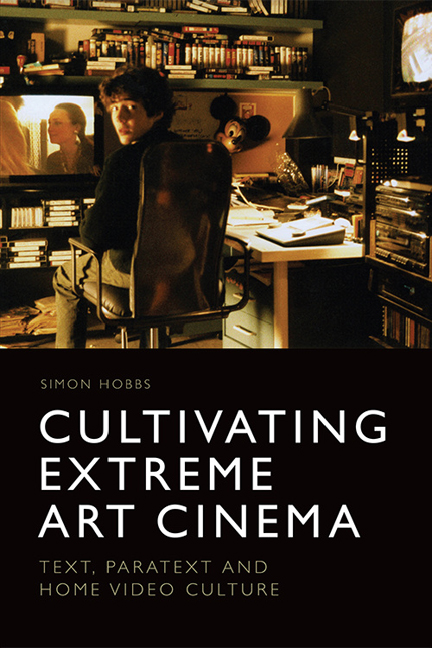Book contents
- Frontmatter
- Contents
- List of Figures
- Acknowledgements
- 1 Introduction
- 2 Art and Exploitation: Crossover, Slippage and Fluidity
- 3 Early Extremity on DVD: History, Precursors and Exploitation Auteurs
- 4 Weekend and Cannibal Holocaust: Art, Ballyhoo and Remediation
- 5 Salò, Or the 120 Days of Sodom and Ilsa, the Wicked Warden: Fascism, Pornography and Disgust
- 6 Contemporary Extremity on DVD: Trends, Hard-core and Geographic Mobility
- 7 Michael Haneke: Glaciation, Legitimacy and Transgression
- 8 Lars von Trier: Provocation, Condemnation and Confrontation
- 9 Conclusion
- Bibliography
- Index
4 - Weekend and Cannibal Holocaust: Art, Ballyhoo and Remediation
Published online by Cambridge University Press: 28 April 2021
- Frontmatter
- Contents
- List of Figures
- Acknowledgements
- 1 Introduction
- 2 Art and Exploitation: Crossover, Slippage and Fluidity
- 3 Early Extremity on DVD: History, Precursors and Exploitation Auteurs
- 4 Weekend and Cannibal Holocaust: Art, Ballyhoo and Remediation
- 5 Salò, Or the 120 Days of Sodom and Ilsa, the Wicked Warden: Fascism, Pornography and Disgust
- 6 Contemporary Extremity on DVD: Trends, Hard-core and Geographic Mobility
- 7 Michael Haneke: Glaciation, Legitimacy and Transgression
- 8 Lars von Trier: Provocation, Condemnation and Confrontation
- 9 Conclusion
- Bibliography
- Index
Summary
Jean-Luc Godard's Weekend and Ruggero Deodato's Cannibal Holocaust have been firmly located within the traditions of ‘highbrow’ art cinema (Weekend) and ‘lowbrow’ exploitation film (Cannibal Holocaust). While these distinctions are useful, this chapter will look to highlight the slippage present between the narratives, in particular the manner in which they use and display the human body. Through this, I will showcase how both films exist as part of the historical trajectory mapped in Chapter 3 and come to inform later portrayals of extremity. Thereafter I will investigate how these two films are commercially presented, paying particular attention to any shared tactics that may cut across traditional marketing customs and extend their textual affinity.
Jean-Luc Godard and Weekend
When assessing the career of Godard, links to the French New Wave are unavoidable, due to both the status of the movement and the director's role within it (Marie 2003: 1). As can be investigated elsewhere in more detailed accounts (examples of which include French Cinema: The A–Z Guide to the ‘New Wave’ [Durgnat 1963], A History of the French New Wave Cinema [Neupert 2002], The French New Wave: An Artistic School [Marie 2003], and Reading the French New Wave: Critics, Writers and Art Cinema in France [Ostrowska 2008]), the French New Wave was typified by its rebellion against the mainstream and remains a bastion of the art film tradition. Equally, Godard himself is widely considered as an indispensable component of ‘highbrow’ film culture. Roundly celebrated within critical and scholarly discourses, the level of ‘high’ cultural legitimisation afforded Godard's cinema is confirmed in part within the writing of David Nicholls, who introduces the term ‘Godardinism’ (1979: 22). The quasi-religious nature of the term provides evidence of Godard's enduring legacy, whereby he is repeatedly cast as one of the fundamental pillars of the art-house scene. Notably I am not going to try to challenge this placement, or lavish further praise on the filmmaker. Rather I am interested in examining the ways this unyielding reputation is presented to the consumer, and how it behaves upon a commercial artefact that has the potential to evoke ‘lowbrow’ associations.
- Type
- Chapter
- Information
- Cultivating Extreme Art CinemaText, Paratext and Home Video Culture, pp. 63 - 87Publisher: Edinburgh University PressPrint publication year: 2018



